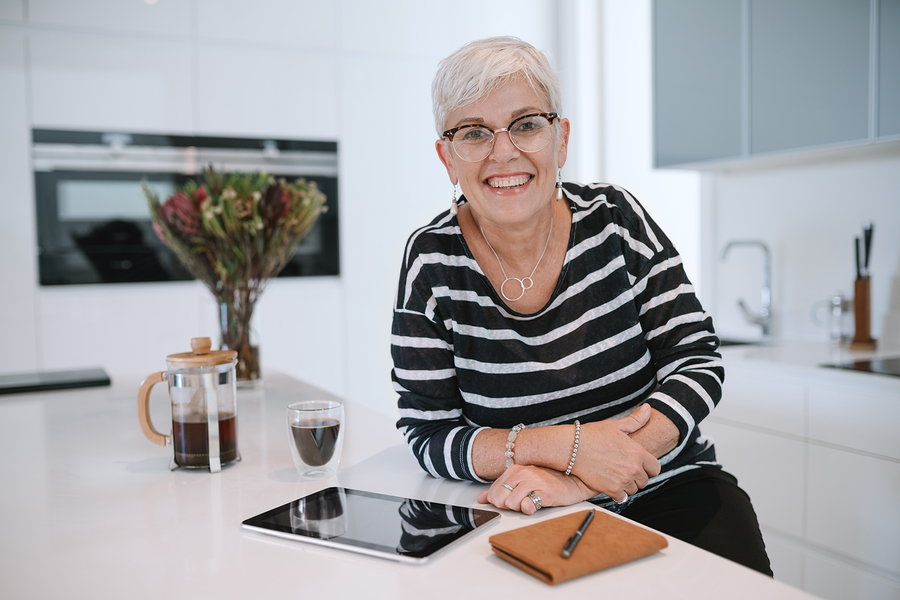Home Design Tips for People Struggling With Sight

If you have a senior loved one in your life who struggles with their eyesight?then they are not alone. There are many seniors who just can?t see quite as well as they once did, and sometimes it can make even the simplest of everyday activities a challenge. If these seniors are living at home and on their own?then it is important that their space works with their visual limitations to help make life a little easier.
While many people think of interior design simply as being all about the aesthetics?there are many ways to use interior design in order to help make life easier for seniors who struggle with their eyesight. A lot of these changes may seem minimal?but they can completely change the way in which your loved one navigates their home and how long they are able to live safely at home.
Keep these easy tips in mind to help design your loved one?s living space in a way that will really help them function at home.
Use Contrast to Your Advantage
When things in the home are high-contrast, they are much easier to see. Plain and simple. Color can help seniors identify different rooms and help make it easier for them to see obstacles that may be in their way. Using high contrast furniture against light walls (and keeping the space clean and organized) is a great way to prevent trip and fall issues in the home.
Falls are the number one reason that seniors end up in the hospital and most falls happen right in the home?so think high contrast when you think about decorating. Here are a few places you can add contrast to the home to make it safer and easier to navigate:
- High contrast furniture
- High contrast doors and doorways
- High contrast light switches and sockets
- High contrast railings and handrails
Many seniors feel like colors are washed out as their sight goes, and when you use a lot of same colored hues in a space, it can make it very difficult for seniors to differentiate one object from the next.
Color the Doors
It may seem like a bold design choice from an aesthetic viewpoint?but if you want to make sure that your senior loved one can easily spot important doors (like the bathroom doors) a different color. This will make the doors easy to spot when seniors are in a hurry or potentially confused in the middle of the night trying to find the bathroom.
This can also be very helpful for seniors who have dementia and who may get easily confused in the middle of the night.
Adding Lighting for Safety
Lighting can make all of the difference in the look of a home?but it can also help make a home much safer for someone with sight loss as well. Good lighting can help make up for poor eyesight. This means seniors won?t have to squint and they will be able to clearly see what is in front of them.
Lighting can make a huge difference for someone who can?t sleep. First, make sure that you swap out all of the light bulbs in the house for brighter bulbs. Then consider adding larger, more illuminating light fixtures where necessary in the home. Night lights are also a great safety addition to any space in the home?consider adding night lights on the path from the senior?s bed to their bathroom and their bed to the kitchen.
Motion-censored night lights are also a smart addition to any senior?s space, especially for those who have sight limitations and who get up a lot in the middle of the night.
Take Advantage of Natural Light
In addition to adding lighting throughout the home, it is important to maximize the natural light throughout the home to make the house safer and more comfortable for seniors. Allowing natural light to flow through the windows is also important for helping seniors to stay on a normal sleep cycle as they get more exposure to natural sunlight patterns.
Add Signage
Even if your senior loved one understands what certain things are, it can still be helpful to add signage and labeling to things around the home if they can?t always see what they are looking for. It can be an easy way to find objects in the home, especially if you add labels to things like storage canisters that can be hard to see from afar.
If you are worried about the decor aspect, go ahead and make the signs decorative enough to seem less like an aid for your loved one and more like a design addition.
Make Glasses Really Accessible
This is less of a design tip and more of an accessibility tip?but it?s one that can make life easier for any senior. Get a few extra pairs of durable glasses for around the house and leave them in locations where your senior loved one tends to need their glasses. This can be in the kitchen by the sink, next to their reading chair, by the sofa, near the television or on their bedside table.
Consider leaving them out or putting them in decorative containers or boxes that are easily accessible. If you make glasses part of your loved one?s everyday decor and make it simple for them to grab a pair wherever they are in the house, it will cause much less confusion and will be a great way to make sure that they always have their visual aids when they need them.
Little changes to a senior?s home can help completely change their space for the better and can help make any senior stay independent at home even with certain visual impairments. Having poor eyesight doesn?t have to hinder a senior?s ability to stay independent or live on their own. A few simple tweaks can help make everything easier to navigate.
Author Profile

- Lori Thomas has decades of experience as a caregiver. Her writing for SeniorAdvice.com is informed by years of research as well as hands-on family experience caring for her now late mother, who had chronic health issues for most of her life. Lori is an integral part of the SeniorAdvice.com management team, acting as Vice President of Marketing and Chief Editor.
Latest entries
- 2020.02.20General Senior LivingYour Guide to Long-Distance Grandparenting
- 2020.02.20General Senior LivingHome Design Tips for People Struggling With Sight
- 2020.02.20General Senior LivingSpring Cleaning Tips for Seniors
- 2020.02.20General Senior Living16 Great Exercises Seniors Can Do Outside This Spring

